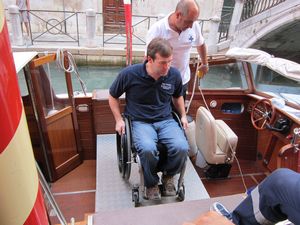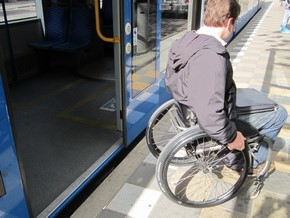6 Myths about Accessible Travel in Europe
No matter what you’ve heard, being disabled doesn’t mean you can’t enjoy a smooth, worry-free, memorable vacation in Europe – it just means you’ll need to take a few precautions and start planning as far in advance as possible.
With this list of 6 Myths About Accessible Travel in Europe, I want to help convey the realities of accessible travel in Europe . It’s time to stop dreaming and start planning your next accessible European vacation!
6 Myths about Accessible Travel in Europe
1. Venice is not accessible – So not true! With a good amount of planning, Venice CAN be accessible.
By utilizing accessible vaporetto routes through the city, taking accessible water taxis (shown below), and staying in wheelchair friendly hotel neighborhoods, wheelchair users and mobility scooter users can have a wonderful vacation in Venice. In fact, we have planned countless accessible trips to Venice and it’s one of my favorite places to visit so it’s certainly possible!
 |
|
Accessible water taxis help disabled travelers avoid the stairs on Venice bridges
|
2. “I’m just going to rent an accessible van and drive it around the city” While driving yourself around in your home city is a convenient way to get around, this option is problematic in many European destinations.
Big-city driving in places such as Paris, London and Rome can make even the best drivers sweat. Not only are these cities heavily congested, but parking (especially accessible parking) can be extremely hard to find. This means you will spend valuable vacation time chasing parking spots and waiting in traffic.
A great alternative is to rely on accessible buses and local drivers who are familiar with the area and traffic conditions. If you only need a ride, you can book an accessible van with a driver. Or, if you are searching for a complete worry-free solution, you can book fully-accessible tours that include an accessible van, a driver and a guide all in one!
3. There are plenty of accessible hotels in the big European cities – Depending on your travel dates and how far in advance you are looking, you may have extremely limited hotel options.
Some hotels might claim to be accessible, however, be aware that they define accessibility by their own terms. This can range from completely step-free with a roll-in-shower to having to navigate steps to reach the elevator.
Keep in mind that most of the centrally-located accessible hotels only have 1 or 2 accessible rooms and these rooms get filled far in advance. For example, our favorite accessible Paris hotel rooms are already filled up for all of June and July!
4. Accessible hotel prices will be similar to back home – Oh, I wish they were! The reality is that many of the accessible hotels in European city centers are housed in historical buildings that have undergone extensive renovations to become 4 or 5 star hotels. These accessible hotels have 4 or 5 star prices which may be more than you were expecting.
5. Accessible taxis are the best option – It depends! Most of Europe has an extensive public transportation system so, depending on where you are visiting, your best transportation options might actually be buses or trams. Not only can public transportation be easier to find and more affordable (especially in major congested cities), it is also quite reliable.
Many buses traveling within city limits in cities such as London, Paris and Berlin are low-floor and have ramps which make them easily accessible to disabled travelers. In many European cities, all you need to know to successfully navigate the city using accessible public transportation is described and illustrated in the Sage Accessibility Guides we provide with our trip planning services.
 |
|
Some of the Tram stations in Amsterdam have raised platforms which provides level access.
|
6. All cruises are created equal – This is definitely not the case. While most of the ships are accessible, the ports and tenders they use are all very different. Tenders can cause issues particularly for mobility scooter users and electric wheelchair users. In some instances manual wheelchair users, including myself, may also be restricted from using the tenders.
In general, I recommend avoiding cruise itineraries where tenders are scheduled. Our accessible cruise booking services can take care of all that research for you!
Did You Know?
Did you know that our disabled clients collectively enjoyed more than 11,000 vacation days in Europe last year? Our accessible travel consultants have a wealth of experience planning accessible vacations in Europe and are waiting to hear from you!
Give us a chance to plan one of your vacations…
you’ll never again travel in Europe without us!
Contact our Accessible Travel Consultants
Travel Wisely,
John Sage, Founder and President of Sage Traveling
Email: john@sagetraveling.com
Phone: US: 1-888-645-7920, UK: +44 20 3540 6155
Web: https://www.sagetraveling.com





